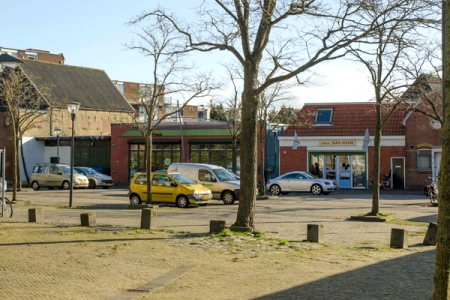Urban Prescriptions
Leeuwarden (NL) – Runner Up
TEAM DATA
Team Representative: Adrià Guardiet (ES) – architect; Associate: Sandra Torres (ES) – architect
estudi08014, c/Callao 10, 2-1., 08014 Barcelona – España
+34 609 167 770 – estudi@estudi08014.com – www.estudi08014.com
See the complete listing of portraits here
See the site page here

S. Torres & A. Guardiet
INTERVIEW
Click on the images to enlarge
1. How did you form the team for the competition?
We have known each other for a long time, since we were students of architecture. Almost from the beginning we have done many projects and competitions together and, more or less one year ago, we finally decided to establish 'estudi08014', a studio where we try to combine architectural practice with research.
2. How do you define the main issue of your project, and how did you answer on this session main topic: Adaptability through Self-Organization, Sharing and/or Project (Process)?
We work in an area of the city of Leeuwarden affected by a decrease in activity in recent years and, in order to reverse this situation, we propose a set of actions at small and medium scale that aim to regenerate the city in different fields. These actions are not focused to transform the image or even the form of the city but the way in which people use it. Therefore, our proposal is linked to the Europan's topic to the extent that it works with the urban fabric as an adaptable support. We believe that the city of the future will not significantly change; it just will be used in a different way.
3. How did this issue and the questions raised by the site mutation meet?
Actions such as the transformation of some inner courtyards into eco-productive areas, the efficient management of water through recovering ancient canals, the more or less temporary occupation of vacant premises and empty plots or the creation of an easily transformable public space according to the needs of any given moment, are specifically linked to the site (to its history, its geographic conditions, its social reality) and, at the same time, linked to the main issue of this edition of Europan.
4. Have you treated this issue previously? What were the reference projects that inspired yours?
Many of these issues have already developed in previous projects and competitions and we will continue to develop them in the future. Obviously, we try to establish links between our interests and research lines and the projects that we do; this is why we have already worked before on issues such as adaptability, availability or regeneration of obsolete structures.
Regarding the references, we can mention the work of Lacaton-Vassal; the urban regeneration projects recently developed in Barcelona and Madrid by collectives of young architects, in direct complicity with the citizenship; the 'civic infrastructures' by Lina Bo Bardi; or the playgrounds by Aldo Van Eyck.
5. Today –at the era of economic crisis and sustainability– the urban-architectural project should reconsider its production method in time; how did you integrate this issue in your project?
In the recent urban projects we have developed, we have incorporated the concept of temporality in different forms. For example, by creating quite basic architectonic supports without a predefined function, which are progressive and transformable over time depending on the needs of the citizenship or the availability of resources. In recent years we learned a lot about this sort of strategies because of the crisis.
6. Is it the first time you have been awarded a prize at Europan? How could this help you in your professional career?
We participated for the first time in the last edition of Europan and we won the 1st prize in Warsaw. Since then, we have gone some times to this city where we have done some meetings with politicians, urban planners, neighbours, local studios, etc. in order to go deeper into the reality of the place and, of course, to obtain a commission.
Moreover, Europan is a great opportunity to meet interesting people with which contrast viewpoints and professional interests. From this point of view, the workshop that took place last year in Pavia was a very enriching experience.








